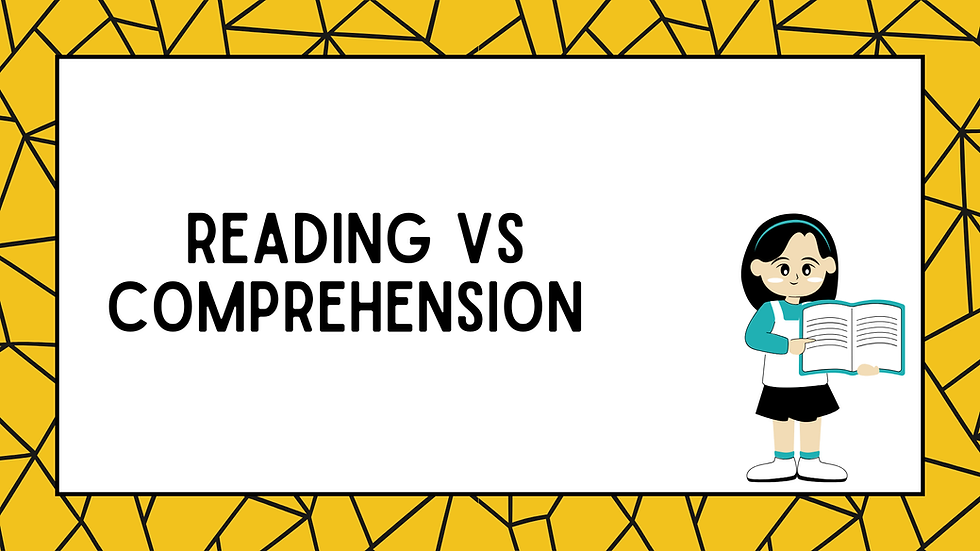Play-based learning: Scrabble
- Ed Grande Tuition
- Jun 8, 2023
- 3 min read
Updated: Aug 7, 2023
Play is a natural and essential part of childhood. Research shows that play can improve children’s ability to plan, organize, get along with others and regulate their emotions.
As a parent, one of the ways you can help your child is by introducing play-based learning activities into their routine. Play-based learning activities are educational experiences designed to engage children in active play while simultaneously promoting learning and skill development. These activities are centred around the idea that children learn best through play, exploration, and discovery.
Today, we would be exploring a play-based learning idea for children called Scrabble.
Scrabble is a word game that has captivated players of all ages since its creation in 1938. The game is played on a square board divided into a grid of cells. Each cell contains a letter tile, and players take turns forming words on the board using their own set of letter tiles.
The objective of Scrabble is to score as many points as possible by strategically placing tiles to form words. Each letter tile has a point value, and the score of a word is determined by adding up the values of the tiles used. Additionally, the board has special cells that offer bonus points for specific letters or entire words.
Playing Scrabble contributes to your child’s learning in many ways:
1. Expands vocabulary
Scrabble encourages children to explore and expand their vocabulary. By forming words using letter tiles, children recall words they know already, learn new words and improve their spelling skills. They get exposed to a wide range of words, including uncommon or challenging ones, which enhances their language proficiency.
2. Word Recognition
Scrabble helps children recognize and understand words better. As they search for words to create and connect on the board, they learn to identify and recognize word patterns, prefixes, suffixes, and word roots. This improves their ability to understand new words they encounter when reading.
3. Strategic thinking
Scrabble encourages children to think strategically. Children need to decide which words they can create, with the letter tiles they have, to get the most points and position them wisely to earn extra points. This promotes critical thinking, problem-solving, and decision-making skills.
4. Maths skills
Scrabble involves adding points based on letter values and positioning words on premium squares for additional points. This aspect of the game enhances children's math skills as they calculate and keep track of scores. They develop mental math, arithmetic, and strategic calculation abilities.
5. Concentration and focus
Playing Scrabble requires concentration and focus as children need to think about the letters they have, words they can create, and plan their moves. This helps improve their attention span and ability to concentrate on a task, which can have positive effects on their overall learning and academic performance.
6. Social interaction
Scrabble is often played with others, which encourages social interaction and improves communication skills. Children engage in friendly competition, take turns, and communicate their ideas and strategies. This can enhance their verbal expression, listening skills, and ability to collaborate with others. 7. Builds confidence
As children learn and improve their Scrabble skills, they gain confidence in their language abilities. Successfully creating words, earning points, and competing with others can boost their self-esteem and motivation to further develop their language skills.

Scrabble is a beloved game for learning. It is a fun game that helps children learn new words, improve spelling, think strategically, practice math, concentrate, interact with others, and build confidence. It supports their language and cognitive development in an enjoyable way.
There are many other ways to play Scrabble, for example:
1. Word-building challenge
You can incorporate this play-based learning idea for your children through word-building, where children build new words and practice reading those new words and sounds. You can provide them with a set of letter tiles, ask them to create as many words as possible within a time limit, and encourage them to read it aloud when they are done.
2. Thesaurus Tournament
For older kids, you can engage them in a game tournament where for every new word a person plays, they must state a synonym and an antonym for that word. 3. Themed Game
You can also introduce themes, where children are assigned a specific theme such as animals, food, nature, etc. Children should create words related to that theme. For older kids, you can add a time limit.
Ultimately, it is important to know that play-based learning activities should be age-appropriate and tailored to each child’s developmental stage.
If you need more ideas on how to execute play-based learning activities, get in touch and we would be happy to help.




